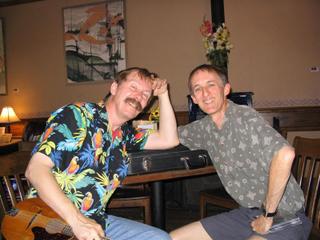Think You'd Better Slow Your Mustang Down
 In 1978, I moved to Colorado and began looking for folks to play music with.
In 1978, I moved to Colorado and began looking for folks to play music with.I quickly learned there wasn't as much old-time music here as in Seattle. Seattle had the G-Note Tavern. Seattle had the Gypsy Gyppos. Seattle had Sandy Bradley and Hank Bradley and Mark Gapanoff and Nancy Katz and Mike Schway and Barbara Lamb and Mark O'Connor. Boulder had ... uh ... uh ...
By dumb luck, I found Anita Dolen and Ray Chatfield and Teri Rasmussen, and we had us a band. Anita christened us "The Grange Hall Flyers."
Pretty soon, the Flyers got an invitation to play at a music festival in Elizabeth, Colorado. I'd never been to a music festival before, and I went with a mixture of fear and curiosity. Were we going to knock everyone's socks off? Were we going to be embarrassingly bad? Would I find any other old-time musicians?
Watching the Morris troupe made the nervousness evaporate. Every time their musicians got something wrong they'd stop and redo the notes they'd missed. Soon, I'd decided we'd do fine, but we wouldn't find anyone new to play with.
Then, Geary Baese and Richard Jones stepped up to the mikes. They were on the program as "The Fiddlin' Fiddlers," a name that still sounds dumb. Without any fanfare, they ripped into a perfect, twin-fiddle, "Fisher's Hornpipe." I stopped, listened, watched, then used my right fist to push up my jaw and close my mouth.
The Flyers went next; then we all sat down to jam. Geary and Richard turned out to be fun guys to waste time with.
A few years passed and Geary was lured away into the mystic land of fiddle making. Richard still played, but moved off towards Irish and jazz. He was living a little more than an hour north and I rarely saw him.
Saturday, Ron Sommers and I were between gigs, so we wandered up to Fort Collins with Ron's girlfriend, Carol. On a lark, Ron phoned Richard.
"Hey. We're over at Starry Nights' Coffee House. Duct-tape the kids and come on down!" said Ron.
Richard and Ron both have fiddles by Geary, so once Richard showed up there was the expected amount of talk about varnishes and fiddle-geeking; we eventually got out of that and started playing tunes. It was beauteous. Plus, they didn't kick us out.
When I came back from refilling my coffee cup, Richard was putting his fiddle away.
"I'm going to a party, but you guys should come over after your gig. The party goes 4-to-4, but I'll be there until 10. We could play some more tunes."
Our 7-to-9 dance didn't end until 10, and both Joel and Ron packed up to head home. Ron said, "I know Richard. We aren't there yet, so he's left. No point in even going over."
Still, it wasn't much out of my way, so I followed Richard's vague instructions: "I don't know the address, but just go all the way to the end of 6th street. It's right there." I figured maybe I'd see balloons or an open door on one of the houses. Worst case, I'd go to the door, ask for Richard and get told he'd gone home, but get invited in for a beer anyway. 10:00 on a Saturday night in Colorado.
I got to the end of 6th and it was an event. A dead-end street blocked off with a white, rail fence at the entrance to a torch-lit field, and on the other side hundreds of people who'd been partying for six hours. The rock-and-roll band on stage was just cranking up a good "Mustang Sally."
There was an RV with folks standing around at the entrance, but I was wearing a Hawaiian shirt and carrying a mandolin. At parties like this, I look like I know where I'm going. As I walked through the gate, I was thinking, "Even if Richard's still here, how would I ever find him?"
Then I looked on stage. Richard grinned over his fiddle at me, motioned with his head, and moved over to make room for me on his mike.
Thinking back on it, I'm pretty sure I'd never performed "Mustang Sally," on stage, on a mandolin, in a rock-and-roll band, before.
Wilson Pickett says, "Think you'd better slow your mustang down." I say, "Who's askin' you?"

0 Comments:
Post a Comment
<<Home